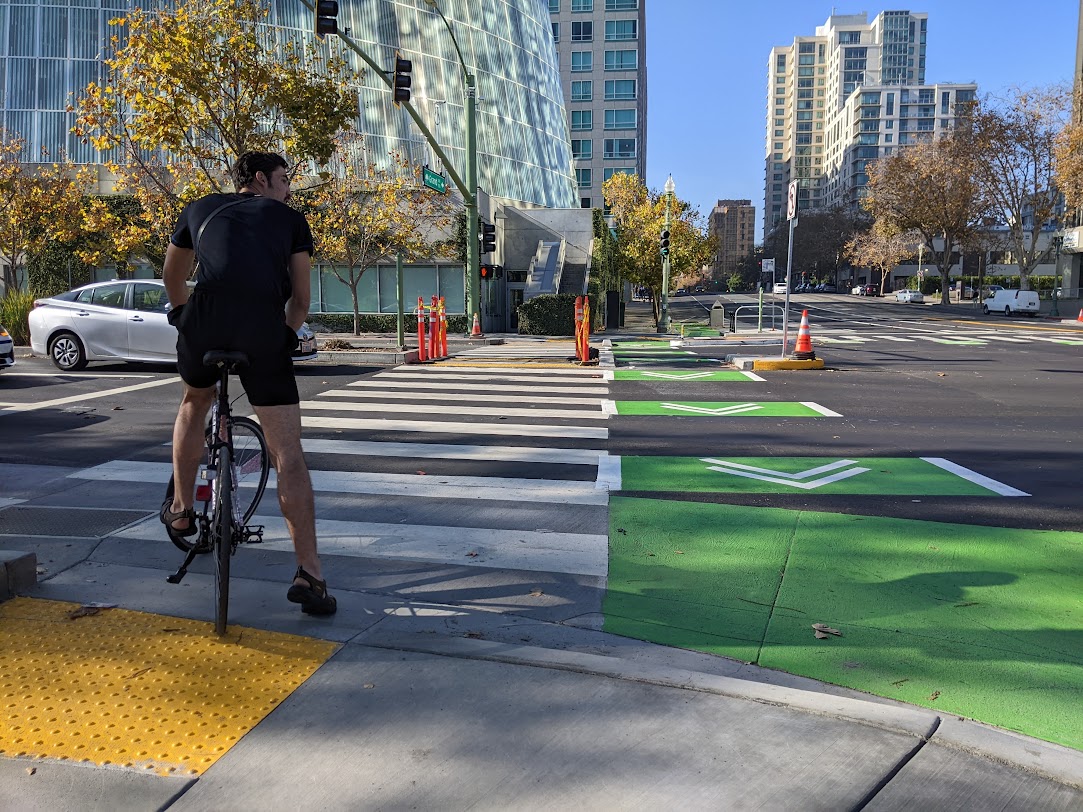 OAC image: BART
OAC image: BARTTransit advocates, community groups, and faith-based environmental justice organizations made another plea to Oakland and regional policy makers to kill the half a billion dollar Oakland Airport Connector (OAC) with a resolution sponsored by Oakland City Council members Nancy Nadel and Rebecca Kaplan at their monthly meeting last night. Citing a significantly more expensive project from the $130 million dollar proposal supported by voters in 2000 without intermediate stops along Hegenberger Boulevard and with fares three times those originally promised, the groups argued in vain that the council should not support the existing proposal but should seek a surface Bus Rapid Transit option at one-fifth the cost.
Most of the political class lined up in opposition to the council resolution and in favor of completing the OAC as an elevated people mover under the current design. A late letter of support from Oakland Mayor Ron Dellums urged several provisions, including intermediate stops and hiring requirements, but did not set up parameters for their inclusion in the project. Most speakers honed in on the need for job creation in Oakland, which is suffering from more than 17 percent unemployment, though disagreement raged over whether or not the construction jobs (estimated from 689 to 15,000, depending on the job creation metric used by the speakers) merited the public outlay of funds.
After testimony from more than 100 public speakers late into the night, at 1:15am this morning Nadel and Kaplan conceded they didn't have the votes to carry the resolution opposed to the OAC and the council approved an alternative resolution introduced by Councilmember Ignacio de la Fuente to support the OAC with three provisos mirroring Dellums':
- Bind local job requirements (50 percent of hires from the region, 25 percent from Oakland) with penalties for non-performance, versus BART's current non-binding hiring objectives
- An intermediate stop funded by BART out of project funding that is allocated, but may not be needed for the project if construction costs reduce the contractor bids below the expected $522-552 million price tag
- An analysis of the OAC Fare with regards to social equity impacts, particularly if bids come in lower than expected
Councilmember Larry Reid, who has been a proponent of OAC for more than 20 years, argued that rejecting the fixed rail connector would prevent Oakland from maintaining its regional competitiveness with other airports. "This is a regional airport," he said. "If we are going to be competitive with San Francisco or San Jose, we need this to be seamless. San Francisco has always been one of our competitive modes."
Reid also urged his colleagues not to put the entire responsibility of funding one or two intermediate stops on BART, but suggested they levy development impact fees within the Coliseum Redevelopment Area to supplement BART. He even referenced an unnamed developer he had been lobbying intensively over the past nine months to site a large commercial development along Hegenberger, one he suggested would benefit greatly from the stop.
Councilmember Kernighan said she was swayed by TransForm's arguments for a lower-cost bus alternative, but was concerned that delaying the project now to study an alternative would set the timeline back by five years and result in the re-allocation the OAC's multiple sources of funding to other counties in the region. According to Kernighan, who said she checked her numbers with the MTC, BART, the Alameda County Transportation Improvement Authority (ACTIA), and TransForm, in the best case scenario, Alameda County could only hope to retain a maximum of $115 of the more than $500 million of project dollars, of which only $7 million could go to funding bus operations at AC Transit (for basic funding numbers click here, scroll down).
"Some people have said the Oakland Airport Connector is a really bad project. I don't think it's a bad project, it's just an expensive project," said Kernighan. "It's a little bit wishful thinking to say that, 'if we don't build this over-priced connector, the East Bay is going to have oodles of money.'"
Council President Jane Brunner went further, calling MTC Spokesperson Randy Rentschler and ACTIA Executive Director Christine Monsen to the lectern, where she ran down each line item of OAC funding and asked where the money would go if they didn't build the connector. In almost every case, argued Rentschler and Monsen, the money would be reprogrammed elsewhere and would not benefit the corridor.
Ultimately, the Oakland Council's provisions were not formally agreed to by BART and the resolution does not have statutory authority over the operator. BART Spokesperson Luna Salaver confirmed that BART is not compelled by the resolution, but said they wanted to maintain good relations with the city:
We do seek to partner with all the local entities that we serve. I know that [BART Director] Carol Ward Allen made a commitment to make sure that many of the jobs that were created would go to Oakland residents and under-served contractors. In terms of a fare, there has always been this issue by the opponents of the connector. $6 was never set in stone. The board is the entity that would have the final say on what the fare would be, not an engineering estimate. It would be based on the realities of the economic situation when the connector opens.
As for the intermediate stop, Salaver said that has always been on the operator's radar and has been the intention should funding be secured. When asked whether BART would use the balance of the up to $150 million in TIFIA loans it has sought from the FTA if construction bids come in significantly lower than $500 million to build an intermediate stop, Salaver said should would have to consult with the project manager. BART would clearly have a competing incentive to return the FTA loan and keep its debt obligations lower.
Although the OAC is now closer than ever to moving forward, opponents are pinning their hopes on a Title VI lawsuit filed by Public Advocates against BART for failing to analyze the impacts of the current OAC project on minority and low income residents of Oakland. The FTA received the lawsuit in early September and has until early December to respond. For a detailed account of the case, read Transbay Blog's excellent coverage here.




